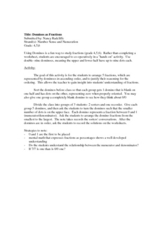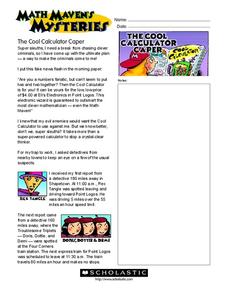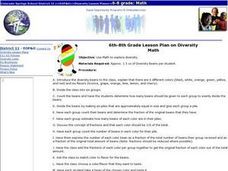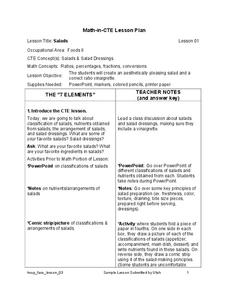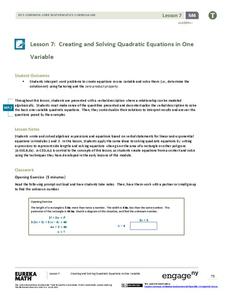Blogger
Slope Intercept Form (y=mx+b) Foldable
Each piece of the y=mx+b formula represents something important about graphing. Take those important ideas and connect them to each part of the formula with notes or examples underneath each tab representing y, m, x,...
Curated OER
Measuring the Area of a Circle
When mathematical errors happen, part of the learning is to figure out how it affects the rest of your calculations. The activity has your mathematicians solving for the area of a circular pipe and taking into consideration any errors...
Curated OER
Take Charge!
Students induce an electrical charge on various objects, and experiment with electrical repulsion and attraction. They define related vocabulary, play Bingo and complete a take-home quiz.
Curated OER
Dominos As Fractions
Students investigate the concept of using fractions in a variety of different contexts. They participate in a hands on activity in the stead of book work. The goal is to get them acquainted with the use of fractions using mental math...
National Math + Science Initative
Introduction to Decimals
Three activities make up an introductory lesson designed to create a strong foundation in comparing fractions to decimals and exploring and building decimal models. Pupils brainstorm and complete a Venn diagram to show how decimals and...
Curated OER
Trigonometry Review Sheet
Get the trig facts fast, and use the review sheet as a guide in the classroom. The worksheet also includes a document version if any changes are needed to the problems. The information includes a small degree/radian chart, a graph of all...
Curated OER
Math Maven's Mysteries: Time for a Crime
In these math word problem worksheets, students help solve the mystery 'Time for a Crime.' Students read the story and use the ferry schedule to help track down the thief. Students circle the name of the guilty suspect.
Curated OER
Math Maven's Mysteries
In these math word problem worksheets, students help solve the mystery about 'The Cool Calculator Caper.' Students use the formula to find what time the evil wrongdoer will arrive in Point Logos.
Curated OER
Tic-Tac-Toe Note Organizer
In this organizer worksheet, students divide a sheet of paper into nine tic-tac-toe sections on which to take notes. The worksheet is a generic, blank graphic organizer.
Curated OER
Hoe Long Does it Take to Get to a Star
Students calculate the distance in light years. In this geometry lesson, students solve problems involving distance, using the distance formula. They rewrite big numbers using scientific notations and apply their knowledge of everyday...
Curated OER
Math Jeopardy
Learners write questions for a Jeopardy game. In this integer review lesson, students review integers by navigating through a linked web site. They play a Jeopardy game. Learners create five questions, one for each of the assigned...
Curated OER
Online Math Learning: Surface Area of Spheres
In this surface area of spheres worksheet, students solve 4 short answer problems. Students find the surface area of spheres, hemispheres, and cones given a radius or a radius and height.
Curated OER
Diversity Math- Fractions
Middle schoolers use jelly beans to gain an understanding of fractions. In this fraction lesson plan, students receive jelly beans and count the number of beans they have in each color. Middle schoolers then name the fraction for...
National Research Center for Career and Technical Education
Salads
Lettuce talk for a moment about your culinary scholars; do they have what it takes to create a great salad? Show them the finer points of salad preparation with a career and technology lesson that combines direct instruction, creativity,...
West Contra Costa Unified School District
Correlation and Line of Best Fit
Computers are useful for more than just surfing the Internet. Pupils first investigate scatter plots and estimate correlation coefficients. Next, they use Microsoft Excel to create scatter plots and determine correlation...
West Contra Costa Unified School District
Introduction to Inverse Functions
Ready to share the beauty of the inverse function with your classes? This algebra II lesson guides the discovery of an inverse function through a numerical, graphical, and an algebraic approach. Connections are made between the three,...
EngageNY
Solving Basic One-Variable Quadratic Equations
Help pupils to determine whether using square roots is the method of choice when solving quadratic equations by presenting a lesson that begins with a dropped object example and asks for a solution. This introduction to solving by...
EngageNY
Creating and Solving Quadratic Equations in One Variable
Give your classes practice at modeling using quadratic models with a resource that uses area and integer problems to allow individuals to create second degree polynomials. Young mathematicians solve equations using factoring and then...
August House
The Pig Who Went Home on Sunday
Turn your classroom into a pig sty with a instructional activity based on the Appalachian folktale The Pig Who Went Home on Sunday. Similar to the story of The Three Little Pigs, the folktale tells a story of four pigs who leave...
West Contra Costa Unified School District
Simplifying Fractions Activity
Warm-up pupils' fraction muscles with a four-question quiz, then delve into a learning game designed to reinforce the concept of simplifying fractions. Based on the "I do, We do, You do" method of teaching, the lesson directly...
Teach Engineering
A Good Foundation
It takes a strong foundation to build a house and a stronger one for a bridge. This resource presents the effects of geology and soil on bridge foundations. Working in groups, the class investigates the interaction of shallow and deep...
EngageNY
Modeling from a Sequence
Building upon previous knowledge of sequences, collaborative pairs analyze sequences to determine the type and to make predictions of future terms. The exercises build through arithmetic and geometric sequences before introducing...
EngageNY
Piecewise and Step Functions in Context
Looking for an application for step functions? This activity uses real data to examine piecewise step functions. Groups create a list of data from varying scenarios and create a model to use to make recommendations to increase...
EngageNY
Bean Counting
Why do I have to do bean counting if I'm not going to become an accountant? The 24th installment of a 35-part module has the class conducting experiments using beans to collect data. Learners use exponential functions to model this...





